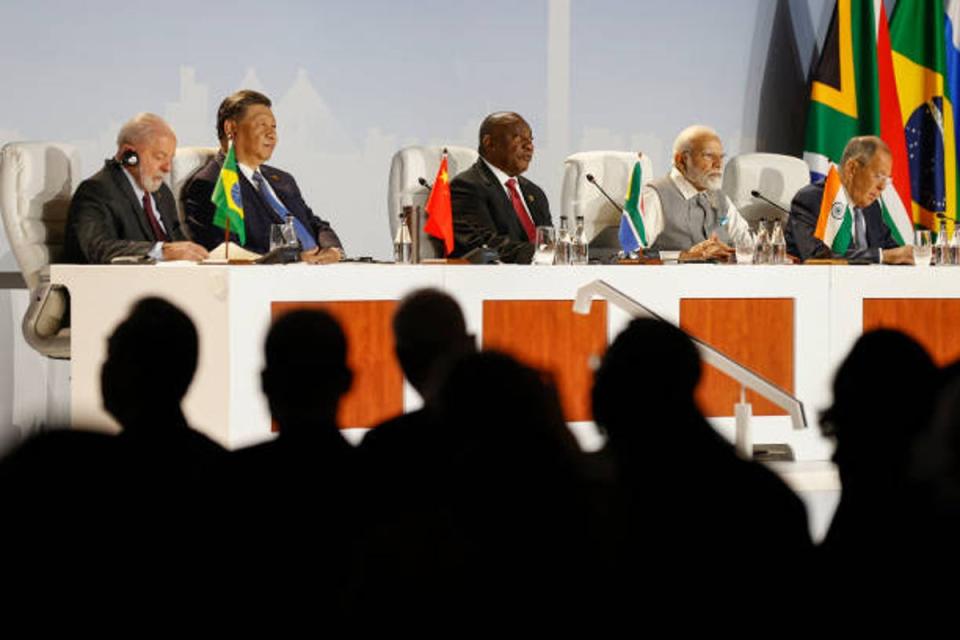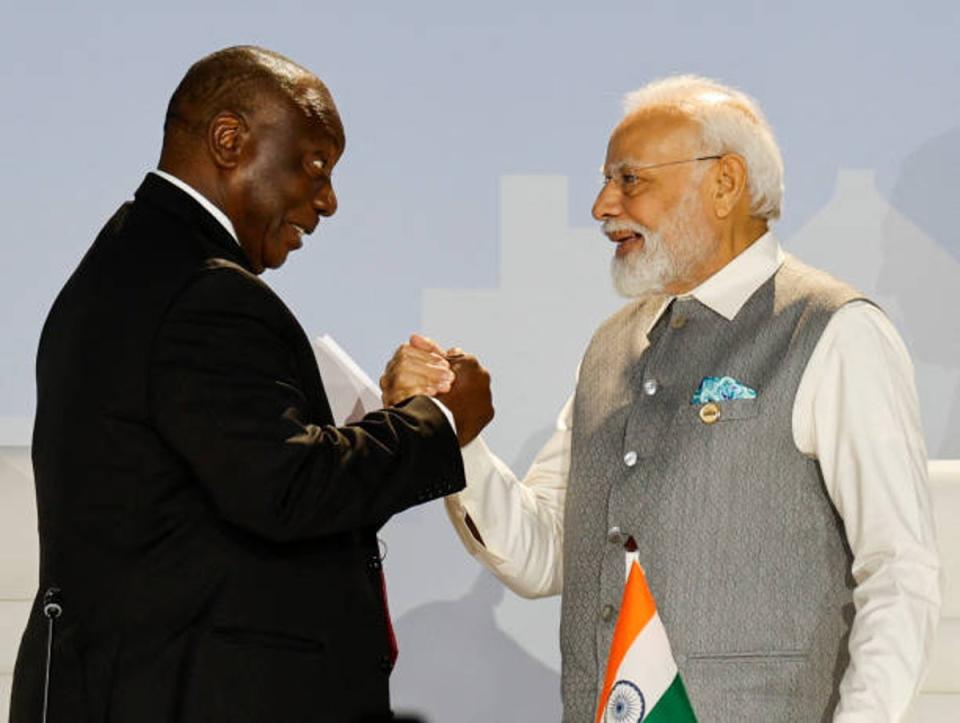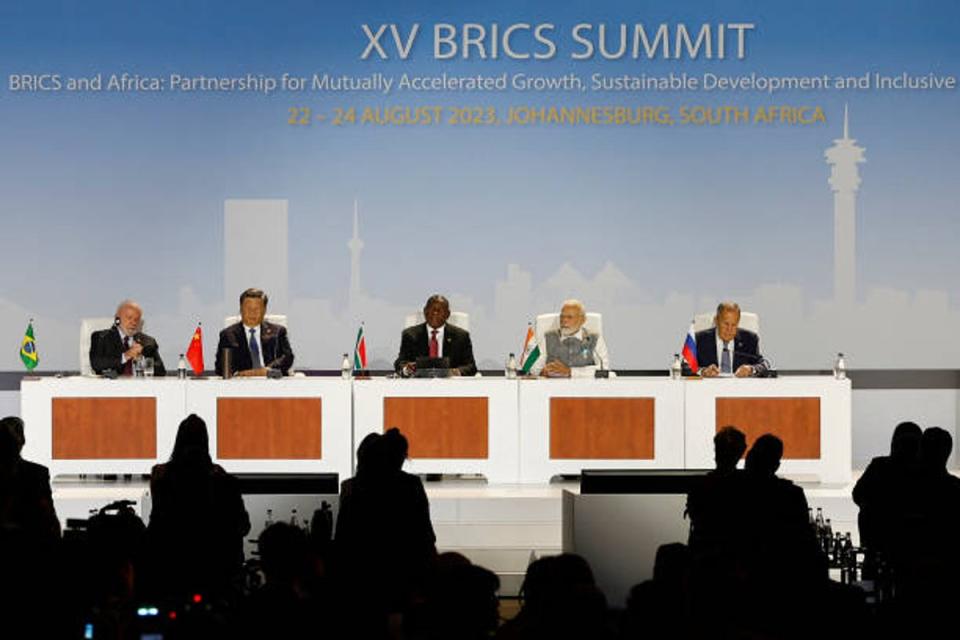ANALYSIS - Does Brics expansion mean a new global order?
When British economist Jim O’Neill coined the “Bric” acronym about two decades ago to denote Brazil, Russia, India and China, he was writing about investment opportunities in nations set to become the world’s top emerging economies.
Then a Goldman Sachs banker, he did not think that the four countries will borrow his idea to form a transnational bloc eight years later in 2009.
Now, the five-member group of developing nations has agreed to expand the alliance further to include Argentina, Ethiopia, Iran, Saudi Arabia, Egypt and United Arab Emirates in a bid to provide a counterweight to the dominance of Western alliances in global affairs.
"This membership expansion is historic," Chinese president Xi Jinping, the bloc’s most stalwart proponent of the enlargement, said. "It shows the determination of Brics countries for unity and cooperation with the broader developing countries."
The six new candidates will formally become members on 1 January 2024, South African president Cyril Ramaphosa said when he named the countries during a three-day leaders’ summit he is hosting in Johannesburg.
"Brics has embarked on a new chapter in its effort to build a world that is fair, a world that is just, a world that is also inclusive and prosperous," Ramaphosa said.
"We have consensus on the first phase of this expansion process and other phases will follow."
The expansion adds economic heft to Brics whose current members are China – the world’s second-largest economy – as well as Brazil, Russia, India and South Africa.
The move is also aimed at increasing Brics’s clout as a champion of so-called Global South nations, many of which feel unfairly treated by international institutions dominated by the United States and other wealthy Western nations, explains professor Swaran Singh, an international relations professor at India’s Jawaharlal Nehru University.
“Expansion of Brics or Brics were never meant for challenging any other system,” he says.
“They were supposed to create an alternative platform to provide some opportunity for least developed and developing countries to participate in international decision making, which automatically perhaps indirectly implies that there is some discomfort with the way international decision making has happened inside the post-second World War international organizations,” he tells The Independent.
“And therefore they were presenting an alternative to create space for these developing countries. And if it is expanding, that means that there is an increasing desire and demand in the world for a platform like this.”

More than 40 countries expressed interest in joining Brics, with 22 formally asking, representing a disparate pool of potential candidates – from Iran to Argentina – motivated largely by a desire to level a global playing field many consider rigged against them.
United Nations secretary-general Antonio Guterres also attended Thursday’s expansion announcement, reflecting the bloc’s growing influence as he echoed its longstanding calls for reforms of the UN Security Council, International Monetary Fund, and World Bank.
"Today’s global governance structures reflect yesterday’s world," he said. "For multilateral institutions to remain truly universal, they must reform to reflect today’s power and economic realities."
And while the criteria for inclusion of new members remains unclear, those invited to join the bloc reflect individual Brics members’ desires to bring allies into the club.
Brazilian president Luiz Inacio Lula da Silva had vocally lobbied for neighbour Argentina’s inclusion while Egypt has close commercial ties with Russia and India. The entry of oil powers Saudi Arabia and UAE highlights their drifting away from the United States’s orbit and ambition to become global heavyweights in their own right.
Russia and Iran have found common cause in their shared struggle against US-led sanctions and diplomatic isolation. With their economic ties deepening in the wake of Moscow’s invasion of Ukraine, Vladimir Putin used his address to lambast the West, highlight the threat they posed to traditional values in developing nations, and signal the emergence of a multi-polar world.

"Make no mistake: this is not just about trade,” says Daniel Silke, director of the South Africa-based Political Futures consultancy. “This is about the fragmentation and political polarisation we are seeing in the world," he notes, adding that China had cited threats of a new Cold War with Washington as a reason to expand.
"The world... has entered a new period of turbulence and transformation," Xi said on Wednesday. "We, the Brics countries, should always bear in mind our founding purpose of strengthening ourselves through unity."
But Singh argues that while the individual countries may have their own national agenda when they address the Brics, “when it comes to collective, the declaration and the tone is much generic”.
“It’s not appearing at all as anti-West. It seeks reforms in the IMF. That is a fair thing that they have been talking about democratizing International institutions.”
“But of course, Iran and Russia would be looking at Brics as their platform if they are getting isolated. This will be the collective which they will kind of depend on.
“So I can understand that Tehran and Moscow would have a very different take on how they see their participation in Brics.
“But overall, Brics is able to balance the tone and you have seen moderation in the final declaration which doesn’t kind of become jingoistic exactly the way Russia would like it to be or Iran would like it to be.
“And of course, Russia, China, India have always said we oppose unilateral sanctions on Iran. So in that sense, you can see the same tone in the final declaration.”
Though home to about 40 per cent of the world’s population and a quarter of global gross domestic product, internal divisions have long hobbled Brics ambitions of becoming a major player on the world stage.
Brics countries have economies that are vastly different in scale and governments with often divergent foreign policy goals. And as a result, the West does not really see Brics as a serious threat to western blocs.
It was evident in the statement by White House national security advisor Jake Sullivan last Tuesday who noted that Washington does not see them as "evolving into some kind of geo-political rival to the United States or anyone else" due to divergence on critical issues.

The view is not unsubstantiated.
Its heavyweight members – China and India – are often at odds: New Delhi is more friendly to the West and has military deals with the United States, while it is in sometimes violent conflict with Beijing over their Himalayan border.
For Russian president Vladimir Putin the bloc is a forum to jab at the West that has sought to isolate Moscow over its invasion of Ukraine. But Lula used the summit to reiterate Brazil’s position of "defending sovereignty (and) territorial integrity" of countries, in an apparent swipe at Russia over its invasion of Ukraine.
“I doubt that an expanded Brics can pose any real challenge to existing blocs - Brics has always been incoherent politically speaking – while the Russians and Chinese have had a clear anti-West agenda, India and the rest do not necessarily see the world this way,” says Jabin Thomas Jacob, an associate professor specialising in China’s domestic politics and foreign relations at New Delhi’s Shiv Nadar University.
“India has issues with Western economic domination but it is much closely aligned with the West on matters of international law and norms than it is with China or Russia.
“The Brics countries might look like they have taken a neutral stance on the Russian invasion but there are differences between them,” says Jabin. “Clearly, China is much more invested in a Russian victory while the others are much more concerned about a quick end to the conflict and disruption in the grain and energy markets.”
Additional reporting by agencies


